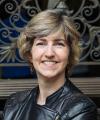Justin Russotti, Ph.D., LCSW
 Associate Director of Research, Mt. Hope Family Center
Associate Director of Research, Mt. Hope Family Center
Dr. Russotti’s research is guided by a developmental psychopathology framework and focuses on understanding how psychopathology unfolds over time within an individual as a result of complex culminations of dynamic interactions between the individual and their environment. He is particularly interested in the etiological roots and mechanistic underpinnings of stress-related and internalizing disorders (e.g., depression and anxiety). More specifically, Dr. Russotti has examined how the developmental timing of adversity may influence internalizing disorders, with an emphasis on early-life adversity. Recently, Dr. Russotti has investigated the effect of parental factors and high-risk parenting conditions (parental psychopathology, parental maltreatment history, and parenting stress) on offspring psychopathology. Dr. Russotti is also involved in longitudinal research designed to investigate the long-term psychological and biological effects of chronic stress (e.g., compromised physical health, allostatic load, epigenetic modifications). Dr. Russotti is a licensed clinical social worker in New York State with expertise in providing psychotherapy interventions to children, adolescents, and adults.
Melissa Sturge-Apple, Ph.D.
Professor of Psychology, University of Rochester
Dr. Melissa Sturge-Apple is Dean of Graduate Studies in Arts, Sciences & Engineering, and a Professor of Developmental Psychology at the University of Rochester. She has established expertise in advancing knowledge of our understanding of parenting within the family context and implications for child development broadly, with a particular emphasis on parenting at risk. At a substantive level, her work has advanced how different theoretical formulations may inform understanding of the determinants of aberrations in parenting within stressful ecologies including family systems theory, stress system functioning, self-regulation frameworks, and attachment theory.
Jody Todd Manly, Ph.D.
Clinical Director, Mt. Hope Family Center
Sr. Research Associate, Clinical Director & Assistant Professor, University of Rochester
Dr. Todd Manly has served in Principal Investigator, Co-Investigator, Evaluator, and Project Director roles on several federally-funded research projects involving the linkages among child maltreatment, domestic violence, poverty, and community violence with preschool and school-aged children as well as adolescents. As Clinical Director at the Mt. Hope Family Center, she has coordinated the implementation of evidence-based treatment models and evaluation of these models in treatment evaluation research. She has conducted numerous trainings on the impact of trauma on children’s development and on implementation of evidence-based trauma treatment for children at high risk for abuse and neglect.


 Associate Director of Research, Mt. Hope Family Center
Associate Director of Research, Mt. Hope Family Center

